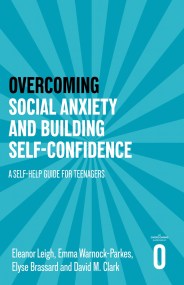Anxiety about embarrassing yourself in social situations is common, particularly amongst teenagers.
Whilst for most these worries are mild, for some young people they are more troublesome and persistent. If you are spending a lot of time feeling shy or worrying about social situations, this can be overwhelming and can have a big impact on your life.
The aim of this book is to help you to understand a bit more about these worries, what you can do about them and how you can reduce your social anxiety and build self-confidence.
Written by clinicians with many years of experience working in services that treat anxiety disorders in children and adolescents, this book follows an approach called cognitive behavioural therapy (CBT), which is a really useful way of helping us to make sense of our experiences and overcome the difficulties that we face. CBT is an evidence-based approach, which means that lots of research has been done to evaluate it and show that it can be helpful.
The book uses case studies, engaging illustrations, exercises and accompanying online resources, and includes help and support on:
· Common fears, such as a fear of blushing and feeling stupid
· Dealing with social media
· Social anxiety around relationships
· How to get help from family, friends or professionals if you are struggling. There is also a chapter for parents/carers and families with suggestions on how they can help.
Overcoming for Teenagers is a series to support young people through common mental health issues during adolescence, using scientific techniques that have been proven to work.
Series editors: Associate Professor Polly Waite and Emeritus Professor Peter Cooper
Whilst for most these worries are mild, for some young people they are more troublesome and persistent. If you are spending a lot of time feeling shy or worrying about social situations, this can be overwhelming and can have a big impact on your life.
The aim of this book is to help you to understand a bit more about these worries, what you can do about them and how you can reduce your social anxiety and build self-confidence.
Written by clinicians with many years of experience working in services that treat anxiety disorders in children and adolescents, this book follows an approach called cognitive behavioural therapy (CBT), which is a really useful way of helping us to make sense of our experiences and overcome the difficulties that we face. CBT is an evidence-based approach, which means that lots of research has been done to evaluate it and show that it can be helpful.
The book uses case studies, engaging illustrations, exercises and accompanying online resources, and includes help and support on:
· Common fears, such as a fear of blushing and feeling stupid
· Dealing with social media
· Social anxiety around relationships
· How to get help from family, friends or professionals if you are struggling. There is also a chapter for parents/carers and families with suggestions on how they can help.
Overcoming for Teenagers is a series to support young people through common mental health issues during adolescence, using scientific techniques that have been proven to work.
Series editors: Associate Professor Polly Waite and Emeritus Professor Peter Cooper
Newsletter Signup
By clicking ‘Sign Up,’ I acknowledge that I have read and agree to Hachette Book Group’s Privacy Policy and Terms of Use









